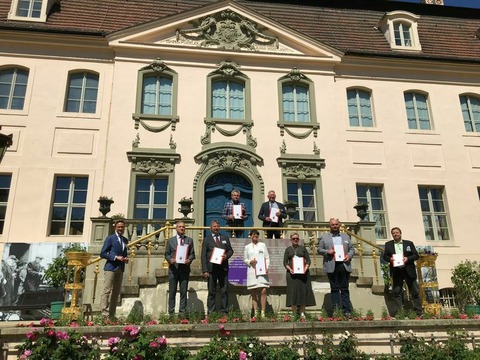What is the Park Association?
The joint adventure began on 16 November 2010. At the very beginning with two Pückler Parks - Bad Muskau Łęknica and Branitz as well as the East German Rose Garden of Forst (Lausitz) and Brody Castle Park (Pförten). By creating a cross-border cultural identity, the staheholders sought to have a lasting impact on education, tourism and business in the region and thus contribute to structural change in Lusatia and to European integration. In the first few years, the inhabitants of the German-Polish border region had the opportunity to engage with their shared German-Polish – and thus also European – history during joint German-Polish exhibitions, history projects, publications, theatre events and workshops.
Successful development of the park association was the condition for the addition of a further five palace and park complexes in 2018: Altdöbern castle park in Brandenburg, Kromlau rhododendron park and Neschwitz palace complex in Saxony, and Żagań palace and park (Sagan) and Zatonie ducal park (Günthersdorf) in Poland. Commissioned by outstanding historical personalities such as Prince Pückler, Heinrich Count of Brühl or Dorothea Duchess of Sagan, these residences and parks formed cultural focal points with Europe-wide connections and have retained their prominence to this day.
In 2020, the nine partners had cause to celebrate when the European Park Association of Lusatia was granted EU funding for a joint project that it had applied for via the Spree-Neisse-Bober Euroregion. On 3 June 2020, the members of the European Park Association of Lusatia signed the partnership agreement in Branitz Park for the INTERREG-funded project entitled "Sustainable strengthening and reorientation of the European Park Association of Lusatia 2021".
The main goal of the project was to further intensify exchanges between participating municipalities and park administrations. This goal was achieved primarily through joint thematic summers and events or in the form of Polish-German park seminars and workshops with representatives of full-time and volunteer conservationists. The new support project was aimed primarily at citizens of Lusatia. The realized events on participation and maintenance of historical-park heritage in our border region offered the opportunity to get to know each other better and meet together. With this, the Park Association contributed to the integration of the region, as well as mutual understanding on many levels.

The cooperation program Interreg VI A Brandenburg – Poland 2021–2027
Project duration: July 2024-June 2027
Lead Partner: City of Cottbus/Chóśebuz ; Project partners: City of Zielona Góra, City of Forst (Lausitz), City of Żagań, Municipality of Brody.
The main objective of the project is to strengthen the role of culture and sustainable tourism in economic development, social inclusion and social innovation by increasing the awareness of residents of common culture and history, intensifying cross-border cooperation in the field of arts and culture, and changing the approach to the presentation of cultural offerings in the border area with particular attention to the needs of people with disabilities and seniors, in the form of:
- improving park infrastructure (revitalization measures and roofing of the ruins of the palace in Zaton, new plantings of park avenues in Brody)
- Expanding the cultural offer of all parks (thematic summers across borders dedicated to Princess Dorothea, Lucie Pückler and Brühl, as well as related cooking seminars, concerts, park seminars and civic workshops),
- digital pilot activities (mobile and modern information kiosks so-called “eyecatchers,” the concept of introducing a digital map of the park for display on various end devices and for providing information, such as for the visually or hearing impaired, an audio guide as a web application.
The new approach goes beyond accepted practices in the program area. Until now, the offerings have been treated separately, and tourist information at a given location has only been about one site. After the implementation of the project, when visiting one of the parks/palaces, we will be able to obtain information about other locations, in a manner tailored to our needs (adapted language, presentation and detail).
Following the implementation of two partnership projects focused on the preservation and use of park landscapes and the strengthening of networks between cities and institutions managing historic palaces in the Lubuskie and Brandenburg regions, the area faced further challenges. The problem is the still low contribution of culture and sustainable tourism to economic development, social inclusion and social innovation.
The project's activities are a response to the diagnosed problems and limitations. The organization of thematic years dedicated to three important people in shaping the history and architecture of the assisted area in three consecutive years of the project will contribute to raising awareness of common culture and history.
The project partners, meeting the challenges of the program, plan to create related cultural offers. These will be events that will take place in several locations, e.g. events with the same theme first in Zaton, then in Żagań or Cottbus.
An important aspect of the project in each foreseen activity is the elimination of barriers that make it difficult or even impossible for people with disabilities and the elderly to access the offer.
The activity will be complemented by an information campaign to inform target groups about the organization of events. Information will be provided in the press, on partners' websites and in social media.
Target groups:
- People using tourist and cultural offerings (e.g., tourists, families, tour groups, cultural tourists, local recreation seekers) with a special focus on the disabled and seniors. These people will gain an attractive facility without architectural barriers with well-developed tourist facilities (benches, directional signs, toilets). This will allow them to explore the entire park at their own pace, with the ability to rest and take shelter in case of a sudden change in weather.
- residents of the assisted area - will gain an attractive place, fully revitalized, ideal for a day trip.
The project is co-financed by the INTERREG VI A Brandenburg-Poland 2021-2027 program, which supports Polish-German cooperation in the Brandenburg-Poland border region with funds from the European Regional Development Fund (ERDF) under the “European Territorial Cooperation” objective.


